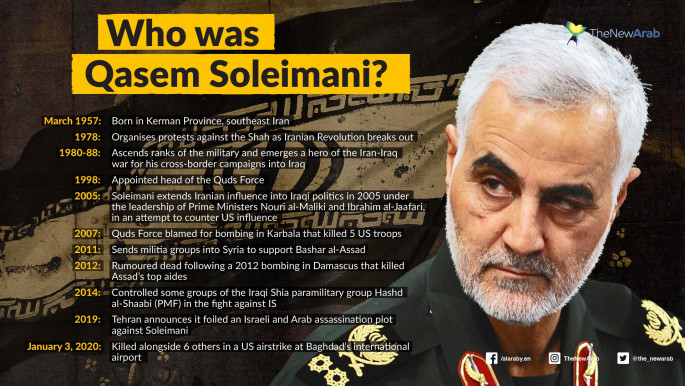Iran's Guards strike Iraq bases housing US troops in first retaliation since Soleimani killing
"Tens of missiles" were launched by the Iranian Revolutionary Guard Corps, which confirmed an attack on Ain Al-Assad Airbase and a mlitary base in Erbil, just days after the killing of the IRGC's chief Major General Qasem Soleimani in Baghdad.
"The brave soldiers of IRGC's aerospace unit have launched a successful attack with tens of ballistic missiles on Al Assad military base in the name of martyr Gen.Qasem Soleimani," an IRGC statement said, according to state-run Press TV.
The Pentagon also confirmed the attack.
"At approximately 5.30 pm (2230 GMT) on January 7, Iran launched more than a dozen ballistic missiles against US military and coalition forces in Iraq," Assistant to the Secretary of Defense for Public Affairs Jonathan Hoffman said in a statement.
"It is clear that these missiles were launched from Iran and targeted at least two Iraqi military bases hosting US military and coalition personnel at Al-Assad and Erbil."
There were no immediate reports of casualties at the bases.
The killing of the key Iranian player in regional politics and security drew outrage from Iran and Soleimani's many supporters in Iraq.
Iran has already vowed "vengeance" for Soleimani, who was mourned by unprecedented crowds across the country Monday.
President Donald Trump warned on Saturday that the US is targeting 52 sites in Iran and will hit them "very fast and very hard" if the Islamic republic attacks American personnel or assets.
In a tweet defending Friday's drone strike assassination of a top Iranian general in Iraq, Trump said 52 represents the number of Americans held hostage at the US embassy in Tehran for more than a year starting in late 1979.
Trump said some of these sites are "at a very high level & important to Iran & the Iranian culture, and those targets, and Iran itself, WILL BE HIT VERY FAST AND VERY HARD. The USA wants no more threats!"
Trump took to Twitter after pro-Iran factions ramped up pressure on US installations across Iraq with missiles and warnings to Iraqi troops - part of an outburst of fury over the killing of Soleimani, described as the second most-powerful man in Iran.
The attack has prompted fears of a major conflagration in the Middle East.
On Sunday the Iraqi parliament voted in support of expelling US troops after widespread anger over the atack - which also killed Iraqi paramilitary leader Abu Mahdi al-Muhandis - though Trump has refused to withdraw.
Trump warned that a US departure would leave a gap that would be filled by Iran, whose powerful political influence in Iraq was spearheaded by Soleimani.
"If we leave, that would mean that Iran would have a much bigger foothold, and the people of Iraq do not want to see Iran run the country. That I can tell you," Trump told reporters.
Read more: Iraq parliament demands foreign troops expulsion after Soleimani killing
"The Iraqi people were not happy when the suggestion was made yesterday that we were thinking about leaving at some point," he said.
Twitter Post
|
"But at some point, we will want to leave."
US officials also defended the decision to kill Soleimani, who was a commander of the Islamic Revolutionary Guard Corps in charge of Middle East regional affairs, and who was considered one of the most powerful people in Iran.
While the White House and Pentagon continued to withhold details of the rationale for Friday's drone strike, Esper said Soleimani was planning imminent attacks against US assets.
"I think it's more fair to say days, for sure," Esper said.
Not a vacation
"They weren't there to discuss a vacation. They weren't there to go to a nice resort some place in Baghdad," Trump said of Soleimani and top Iraqi military figure Abu Mahdi al-Muhandis, also killed in the strike.
"They were there to discuss bad business, and we saved a lot of lives by terminating his life."
Esper said he fully expected Tehran to retaliate, and cautioned that while the United States "is not seeking a war with Iran, we are prepared to finish one."
"We are seeking a diplomatic solution but first, this will require Iran to de-escalate," he said.
"It will require the regime to come to the table with the goal of preventing further bloodshed."
Meanwhile, a number of coalition members, including Canada and Germany, confirmed they would move their troops to Kuwait temporarily.
On the other hand, France and Italy said they would remain in the country and had no intentions of moving.
Follow us on Twitter and Instagram to stay connected

![Palestinians mourned the victims of an Israeli strike on Deir al-Balah [Getty]](/sites/default/files/styles/image_684x385/public/2024-11/GettyImages-2182362043.jpg?h=199d8c1f&itok=xSHZFbmc)


![The law could be enforced against teachers without prior notice [Getty]](/sites/default/files/styles/image_684x385/public/2178740715.jpeg?h=a5f2f23a&itok=hnqrCS4x)
 Follow the Middle East's top stories in English at The New Arab on Google News
Follow the Middle East's top stories in English at The New Arab on Google News
![Left-wing candidate Jill Stein campaigns in Michigan in October [Getty]](/sites/default/files/styles/image_330x185/public/2024-11/GettyImages-2176828619.jpg?h=199d8c1f&itok=h2FXzBuP)

![The law could be enforced against teachers without prior notice [Getty]](/sites/default/files/styles/image_330x185/public/2178740715.jpeg?h=a5f2f23a&itok=xMdFOAIF)